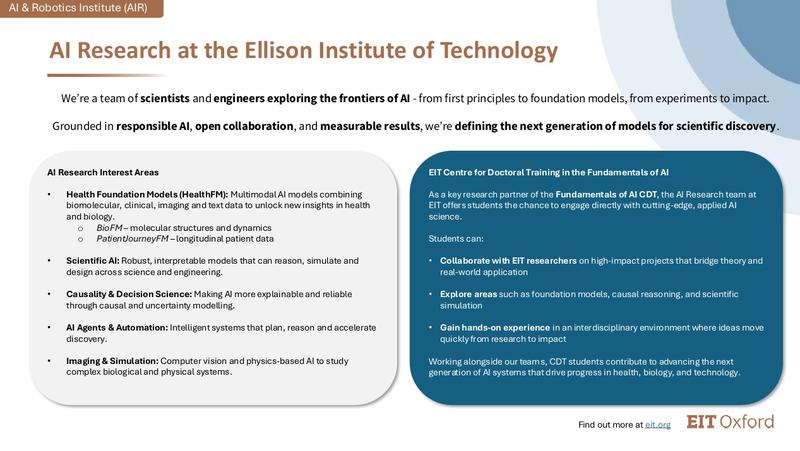Funding & How to Apply
Please read the instructions on how to apply carefully. Your statement of purpose must be structured as requested below, with answers to each of the questions in individual separate sections
How to Apply - please read the instructions on how to apply carefully. Your statement of purpose must be structured as requested, and answer each of the questions in individual separate sections
We are taking part in initiatives to improve the selection procedure for graduate applications, to ensure that all candidates are evaluated fairly.
-
Socio-economic data (where it has been provided in the application form) and your contextual statement (if you choose to provide one) will be used as part of an initiative to contextualise applications at the different stages of the selection process.
-
Once academic shortlisting has taken place, we will use information on ethnicity as part of an initiative to ensure that applicants who identify as Black British are invited to interview.
-
We recognise that socio-economic data may not fully capture an individual student’s personal circumstances, so if any of the criteria listed below apply, we encourage you to submit a statement providing additional detail on your personal circumstances using this contextual statement form (this link will be made available once applications open). This will not be made available to assessors during the initial phase of academic shortlisting, but may be used in association with socio-economic data to contextualise short-listing and decision-making processes.
-
You may wish to provide a contextual statement, particularly if you:
-
are in the first generation of your family to go to university
-
have been in care for at least three months
-
have been a young carer
-
are from a low-income background
-
have received a means-tested scholarship
-
have needed to work to support yourself during your academic studies because of your socio-economic circumstances
-
are a refugee
-
are neurodivergent
-
have or have had one or more disabilities or chronic illnesses that have affected you in education or at work
-
wish to disclose other circumstances that have substantially affected you in education or at work
-
-
As a minimum, applicants should hold or be predicted to achieve the following UK qualifications or their equivalent:
-
a first-class or strong upper second-class undergraduate degree with honours in statistics, mathematics, computer science, engineering, physics or a closely related subject.
Entrance is highly competitive and most successful applicants have a first-class degree or the equivalent.
A previous master's degree is not required, but it is expected that most applicants with a ‘physical science’ background will have completed a four-year integrated master's course. The undergraduate degree requirement may be alternatively demonstrated by strong performance in a relevant master's degree.
For applicants with a degree from the USA, the minimum overall GPA that is normally required to meet the undergraduate-level requirement is 3.6 out of 4.0. However, most successful applicants have a GPA of 3.8 or above. No Graduate Record Examination (GRE) or GMAT scores are sought.
If your degree is not from the UK or another country specified above, visit our International Qualifications page for guidance on the qualifications and grades that would usually be considered to meet the University’s minimum entry requirements. The list of countries in the link above is not exhaustive and we will use other comparison sources such as https://www.ecctis.com/ for countries not listed.
Other qualifications, evidence of excellence and relevant experience
Professional experience, especially research experience in artificial intelligence, is valuable and will be taken into consideration as a substitute for an academic qualification. Applicants must be able to demonstrate, in their statement of purpose and/or CV section of the application form, that they are highly numerate and capable of graduate level research in mathematics and computer science to complete the course. Prior research experience that has resulted in journal or conference publications should be included if present.
English language proficiency
This course requires proficiency in English at the University's higher level. If your first language is not English, you may need to provide evidence that you meet this requirement. More information on this is available on the university website.
Declaring extenuating circumstances
If your ability to meet the entry requirements has been affected by the COVID-19 pandemic (eg you were awarded an unclassified/ungraded degree) or any other exceptional personal circumstance (eg other illness or bereavement), please refer to the guidance on extenuating circumstances (www.ox.ac.uk/admissions/graduate/applying-to-oxford/application- guide/qualifications-experience-languages-funding/extenuating-circumstances) in the Application Guide for information about how to declare this so that your application can be considered appropriately.
All applications must be made via the university admissions portal. Please take note of the admissions deadline for applications for 2026 entry this will be midday (12pm UK time) on 8th January 2026. All material, including references must be submitted by noon on the deadline day and you should aim to submit at least 2 weeks before this date. You are not expected to contact prospective supervisors prior to application.
- Please leave 'Field and title of research project' blank on the 'Course' tab of the application form.
- It is not necessary for you to identify a potential supervisor in your application.
As part of the application form, candidates will be asked to upload:
-
Official transcript(s)
-
For this course, the application form will include questions that collect information that would usually be included in a CV/résumé. You should not upload a separate document. If a separate CV/résumé is uploaded, it will be removed from your application
-
You will need to register three referees who can give an informed view of your academic ability and suitability for the course.
-
Statement of purpose: A maximum of 1,200 words (Word Template for Statement of Purpose - for you to work on and copy into application form on the university portal)
Your statement should be written in English and should focus on your motivation, research interests and career ambitions in the area of the CDT, rather than on other personal achievements, interests and aspirations.
Your personal statement must be structured as follows, and answer each of the questions in individual separate sections
Please be as specific and detailed as possible in your answers. If possible, please ensure that the word counts are clearly displayed on the document.
Please include the question as headings to each section. The question itself need not contribute towards the word count.
You may also use your personal statement to explain any special circumstances relating to any element of your application that you wish to bring to the attention of the assessors.
-
Give an overview of your academic education and professional career to date and how it led to an interest in conducting research in the fundamentals of AI? [250 words]
-
Describe a research project you have undertaken that involved the development of AI theory or methods. What was the problem you addressed? What was your contribution to the development of AI? Explain why an existing, off-the-shelf solution could not be used? [Up to 400 words]
-
Describe a situation where you once made a programming error. How did you discover the error? How did you trace the source of the error? And how was it resolved? [Up to 250 words]
-
What makes the FOAI CDT more appropriate to you than other options for doctoral study? [Up to 150 words]
-
How could your interests support one or more of the EIT themes (https://www.eit.org/)? [Up to 150 words]
-
*If you are invited for interview, you will be asked to undertake some technical exercises. In order to help us determine appropriate questions for you, please tell us your current primary area of interest by selecting one option (ONLY) from the following: Foundations - Applied - Systems
*Please note that your response is only to help guide us with the interview process and does not commit you to this area if you were accepted on to the CDT programme. It will be normal for your ideas and goals to change in some ways as you participate in the programme and you are not committed to work in the specific subject area. You should nevertheless make the best effort to demonstrate your current interests and aspirations based on the definitions below:
Foundations. Researchers in this domain are primarily focused on deep mathematical analysis for the development and further understanding of concepts that have potential broad application to AI such as learning theory, optimisation and stochastic analysis. They may also undertake mathematical analysis of AI methods whose utility have been demonstrated through empirical studies but where theoretical insight has been absent.
Applied. Researchers in this domain are inspired by real-world problems and will focus on developing substantial modifications of foundational concepts to match the particular needs of applications examining issues such as multimodal data integration, missing data, experimental design and causality. They may consider existing heuristically designed AI methods that have demonstrated high performance in applications and reformulate using foundational concepts to improve and extend the use of these approaches.
Systems. Researchers in this domain are concerned with the design, deployment and/or maintenance of large scale AI systems. They could apply formal analysis to understand the properties of such AI systems or substantially adapt and develop foundational concepts to assist in the design of better systems. Research may address topics such as scalability, resource use, safety and algorithmic fairness.
Download a template for the Statement of Purpose
This is a word document with the questions you need to include in your statement of purpose. If helpful you can download this form to help complete your answers to the questions and copy these into the application form on the university portal.
You are not required to contact the CDT prior to application. However, if you do have questions informal enquiries should be made to the CDT in Fundamentals of AI administrator in the first instance.
Candidates are not encouraged to contact academic members of staff before applying or to name a potential supervisor or research project on your application form. Students on the CDT programme will undertake two 10-week rotation projects with different supervisors before selecting their substantive DPhil project. The DPhil project may be an expansion of one of these short projects, a topic from the group project or something new.
Your primary DPhil supervisor is expected to be a member of our supervision pool, but students are encouraged to also work closely with members of EIT research teams. Students may also work with other academics beyond our supervision pool as co-supervisors.
You should not include a research proposal in your application form. Instead of the research proposal we are asking for a number of specific questions to be answered in the Statement of Purpose:
Your statement should be written in English and should focus on your motivation, research interests and career ambitions in the area of the CDT, rather than on other personal achievements, interests and aspirations.
Your personal statement must be structured as follows, and answer each of the six questions in individual separate sections
Please be as specific and detailed as possible in your answers.
If possible, please ensure that the word counts are clearly displayed on the document.
Please include the question as headings to each section. The question itself need not contribute towards the word count.
You may also use your personal statement to explain any special circumstances relating to any element of your application that you wish to bring to the attention of the assessors.
-
Give an overview of your academic education and professional career to date and how it led to an interest in conducting research in the fundamentals of AI? [250 words]
-
Describe a research project you have undertaken that involved the development of AI theory or methods. What was the problem you addressed? What was your contribution to the development of AI? Explain why an existing, off-the-shelf solution could not be used? [Up to 400 words]
-
Describe a situation where you once made a programming error. How did you discover the error? How did you trace the source of the error? And how was it resolved? [Up to 250 words]
-
What makes the FOAI CDT more appropriate to you than other options for doctoral study? [Up to 150 words]
-
How could your interests support one or more of the EIT themes or scientific programmes (for current programmes see http://www.eit.org)? [Up to 150 words]
-
*If you are invited for interview, you will be asked to undertake some technical exercises. In order to help us determine appropriate questions for you, please tell us your current primary area of interest by selecting one option (ONLY) from the following: Foundations / Applied / Systems
*Please note that your response is only to help guide us with the interview process and does not commit you to this area if you were accepted on to the CDT programme. It will be normal for your ideas and goals to change in some ways as you participate in the programme and you are not committed to work in the specific subject area. You should nevertheless make the best effort to demonstrate your current interests and aspirations based on the definitions below:
Foundations. Researchers in this domain are primarily focused on deep mathematical analysis for the development and further understanding of concepts that have potential broad application to AI such as learning theory, optimisation and stochastic analysis. They may also undertake mathematical analysis of AI methods whose utility have been demonstrated through empirical studies but where theoretical insight has been absent.
Applied. Researchers in this domain are inspired by real-world problems and will focus on developing substantial modifications of foundational concepts to match the particular needs of applications examining issues such as multimodal data integration, missing data, experimental design and causality. They may consider existing heuristically designed AI methods that have demonstrated high performance in applications and reformulate using foundational concepts to improve and extend the use of these approaches.
Systems. Researchers in this domain are concerned with the design, deployment and/or maintenance of large scale AI systems. They could apply formal analysis to understand the properties of such AI systems or substantially adapt and develop foundational concepts to assist in the design of better systems. Research may address topics such as scalability, resource use, safety and algorithmic fairness.
We are looking to recruit individuals whose research interests are aligned with our mission and whose academic and professional experience to date meet the following specification:
Delivered an outstanding performance in an undergraduate or postgraduate degree in a subject that involves the extensive study of relevant graduate-level mathematics
We are looking for individuals with an exceptional academic track record and can demonstrate a high level of performance in a subject of study that involves graduate-level mathematical study. This would normally involve successfully completing undergraduate and possibly further postgraduate study in subjects such as mathematics, statistics, engineering, computer science or physics.
Have demonstrable experience of artificial intelligence research
We are looking for individuals to provide evidence of their interest and commitment to artificial intelligence research commensurate with their career stage. This could involve research projects as part of their formal academic studies, internships or professional work experience.
Possess a clear motivation for the study of fundamentals of artificial intelligence
We want to understand how your career record and experiences to date have led to an interest in the further study of the fundamentals of AI. We want to see a compelling vision for how this CDT will support your future aspirations.
Demonstrates an understanding of how the fundamentals of artificial intelligence links to real world impact
While not all FOAI CDT students will have a deep interest in applications of AI and may prefer to focus on theoretical studies only, we want all students to have an appreciation of the link between fundamental AI research and how those outputs can be used in applications. If you are interested in applications, tell us how your interests align with the EIT themes. If not, tell us how you think your theory and methods work could have a range of uses.
Provides indicators of emerging leadership capabilities
We are seeking individuals who can demonstrate the potential to not only undertake great doctoral research but may have the ability to become leaders in their field and beyond. The CDT will develop these skills during the programme but we want candidates who can give examples where they have demonstrated strong communication skills, the ability to engage and work with others, or taken the initiative and responsibility. Evidence could be in the context of academic or professional work but can also be shown through personal interests, sports and hobbies (e.g. charity work).
An application fee of £20 is payable for each application to this course. Application fee waivers are available for the following applicants who meet the eligibility criteria:
-
applicants from low-income countries;
-
refugees and displaced persons;
-
UK applicants from low-income backgrounds; and
-
applicants who applied for our Graduate Access Programmes in the past two years and met the eligibility criteria.
You are encouraged to check whether you're eligible for an application fee waiver before you apply.
Readmission for current Oxford graduate taught students
If you're currently studying for an Oxford graduate taught course and apply to this course with no break in your studies, you may be eligible to apply to this course as a readmission applicant. The application fee will be waived for an eligible application of this type. Check whether you're eligible to apply for readmission.
Application fee waivers for eligible associated courses
If you apply to this course and up to two eligible courses during the same application cycle, you can request an application fee waiver so that you only need to pay one application fee. We recommend that you use your application fee waiver to apply only for eligible courses that are closely related in research area to this one.
To be considered eligible for an application fee waiver, each additional course must be:
-
doctoral level eg a Doctor of Philosophy (DPhil) or Centre for Doctoral Training (CDT) course; and
-
offered by one of the departments in the MPLS Division or one of the departments in the Medical Sciences Division.
If this is the first eligible course that you are applying to, you can request an application fee waiver for an additional course after you have submitted your application for this course. If you have already applied to another course that the meets the eligibility criteria shown above, you should request an application fee waiver before starting an application to this course.
Interviews are normally held as part of the admissions process and are expected to be held in February or March following initial shortlisting of the applications.
Interviews will be held online, normally with at least two interviewers from the supervision pool and one from EIT. Prior to interview you may be required to prepare a short video highlighting your interest in a topic related to EIT and the CDT. In some cases, you may be invited back for a second interview.
Interviews will focus on technical aspects, specifically your foundational mathematical, statistical and computational skills, your appetite to engage with cohort activities, and your commitment to innovation to solve global problems through technological advancements.
AI may be used to assist in researching application materials, but any submitted documents must be written by you and must adhere to our plagiarism policy, and any text that is not your own should be referenced. All supporting documents must be in English, unless stated otherwise on your course page. Supporting documents may not be translated into English by an AI tool, as our academic assessors need to understand your powers of expression in English. Our application assessors will be evaluating your ability to undertake critical analysis, so using AI for more than assistance with initial research is likely to reduce your chances of success.
If academic assessors consider that inappropriate use of AI was made in application documents, they may reject your application. Please note that AI technology to assist with a disability (such as voice recognition software for transcriptions or spelling and grammar checkers) may be used.
Funding

This programme is funded by the Ellison Institute of Technology. We are able to offer fully-funded 4-year studentships to applicants to this programme. Our scholarships are available for applicants from any nationality.
A full 4-year scholarship comprises:
-
course fees at the appropriate rate
-
an enhanced tax-free stipend
-
additional funding to support project costs, training and travel
-
a laptop for your studies
All candidates who apply to the CDT will be considered for funding. Applications must be made directly to the CDT via the University of Oxford admissions portal. When completing your application please ensure you follow the guidelines carefully.





